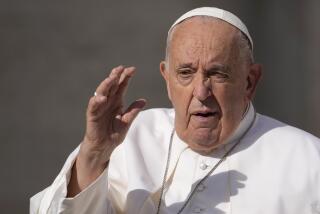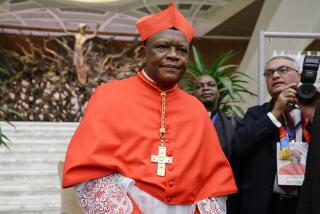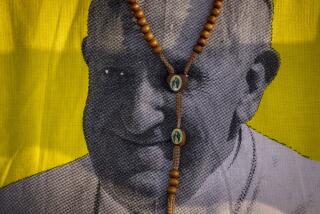Anglican defends Islam comments
- Share via
LONDON — The archbishop of Canterbury on Monday defended himself against a firestorm of recent criticism, telling fellow Anglicans his statement last week that Britain would have to accept some limited form of Islamic law had been misunderstood.
Speaking to a gathering of elected representatives from the Church of England, Archbishop Rowan Williams said he took full responsibility “for any unclarity . . . and for any misleading choice of words that has helped cause distress or misunderstanding.”
He defended what he said as an attempt to open debate on whether “certain additional choices could and should be made available under the law of the United Kingdom for resolving disputes and regulating transactions” involving Muslims, naming as an example legal provisions allowing for Islamic forms of financial transactions such as mortgages.
But he insisted that he was not calling for a two-tiered system of law. “We are not talking about parallel jurisdictions,” he said.
Williams’ arrival was greeted by sustained applause from the audience.
Islamic law, or Sharia, is based on the Koran and the teachings of the prophet Muhammad and practiced in some predominantly Muslim countries. It covers many elements of life, such as who may marry and divorce, how trade is to be conducted and how punishments should be meted out for crimes. Sharia has drawn criticism in the West for its tough punishments for adultery and apostasy and its treatment of women.
In a speech to lawyers and a radio interview last week, Williams said it was “unavoidable” that certain aspects of Islamic law would have to be accepted in Britain, which has a Muslim population of 1.8 million and growing. He said the principles of Sharia should be considered in limited areas, such as family law, and only in cases in which all parties agreed to submit -- and with the proviso that they could opt out at any time.
His comments met a flood of media coverage with calls for his resignation and blasts from critics as well as support from church leaders, politicians, commentators and churchgoers.
His critics included his predecessor, George Carey, who commented Sunday in the tabloid News of the World: “His conclusion that Britain will eventually have to concede some place in law for aspects of Sharia is a view I cannot share. There can be no exceptions to the laws of our land which have been so painfully honed by the struggle for democracy and human rights.”
“Many Muslim interpreters of Sharia believe that it supersedes secular law,” he warned in separate comments to the conservative Sunday Telegraph.
Williams sought to defuse the controversy Monday during his address to the biannual General Synod, at which representatives of the world’s 77 million Anglicans discuss church issues and management.
Some at the synod suggested that Williams had succeeded in calming the storm.
“He expressed clearly what he said and what he meant, and he was received with a warmth and affection, which indicated there should be no further questions about the archbishop of Canterbury,” said Stephen Lowe, the bishop of Hulme, in the diocese of Manchester. “I hope the issues he raised in the first place are properly responded to in the future.”
But some critics, while somewhat mollified, were not wholly persuaded.
Although not calling for Williams’ resignation, the Rev. George Curry, speaking from his parish in Newcastle, in the north of England, said Williams’ comments last week showed “a basic misunderstanding of Islam, because this is about submission to the way taught by Muhammad.”
“The leader of the Anglican faith should lead by showing true Christian toleration of other faiths,” said Curry, who is chairman of the Church Society, a traditional evangelical group. “But he should be giving the moral lead and calling people to honor God within the precepts of the established Judeo-Christian ethic.”
More to Read
Sign up for Essential California
The most important California stories and recommendations in your inbox every morning.
You may occasionally receive promotional content from the Los Angeles Times.













